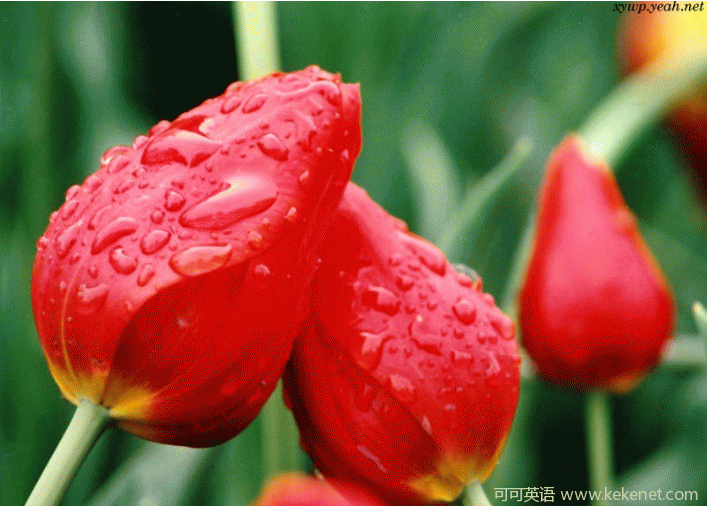(单词翻译:单击)

I finally arrive in the tulip capital of the Netherlands, Leiden, a 15th century textile city where Rembrandt was born and learned how to paint. It's where Clusius planted the first tulips in Western Europe and it's where Holland's first university was founded, a reward granted by William of Orange for the city's bravery in battle against his Spanish Catholic oppressors. But I'm here to learn something about tulips, so I make my way to the Hortus Botanicus in Leiden University. Founded in 1590, it's the oldest botanical garden in the Netherlands and it's where the Dutch national flower-the tulip-was first cultivated.
我终于到达了荷兰的郁金香之都——利登。十五世纪时这里还是一座纺织城市,伦勃朗就在这里出生并学习绘画。克鲁西乌斯在这儿种下了西欧第一批郁金香。荷兰的第一所大学也在这儿创立,那是奥兰治亲王威廉因其勇敢对抗西班牙天主教压迫者而授予的奖赏。而我在这儿是想了解关于郁金香的知识,于是我到了利登大学的植物园。这座植物园于1590年成立,是荷兰最古老的植物园,也是荷兰国花郁金香第一次种植的地方。
Tulip means "turban" and that gives us a clue that the flower didn't originate in Holland but in the steppes of Central Asia where it still grows as a wild flower. The Persians named it after the Sikh headwear that it resembled. The Turks named it "tülbent", and the French and Latin intervention corrupted the name to what we affectionately call it as: the tulip.
郁金香的意思是"穆斯林的头巾",这表明这种花并非源自荷兰,而是出自中亚的草原,现在仍在那里的野外生长。波斯人认为它像锡克教头巾,因此以之为其命名。土耳其人称之为"图利班",后因受法文和拉丁文的影响,最终演变为我们现在温柔轻唤的名字:郁金香。
The Turks have been cultivating tulips since the 10th century, although it wasn't until Suleiman the Magnificent ruled a vast Ottoman Empire 600 years later that the flower was given importance, for Suleiman reigned during a golden age of Ottoman power and grandeur, a period in time called the Tulip Age.
土耳其人自十世纪就开始种植郁金香,但一直到六百年后苏莱曼大帝开始统治庞大的奥斯曼帝国,这种花卉才得到了重视。苏莱曼统治时期,正是奥斯曼帝国最强盛的时期,那个时期又被称为"郁金香时代"。
Carolus Clusius was the first director for this garden in the late 1500s. He was credited for cultivating the tulip in Western Europe when he got bulbs from his friend who was an ambassador for the Ottoman Empire. And thanks to the Dutch climate and its chalky sandy soil, the tulip flourished and thus an industry was born.
卡罗勒斯·克鲁西乌斯在16世纪末担任这花园的首任园长。人们把在西欧种植郁金香的功劳归于他,当时他从朋友——奥斯曼帝国的大使那儿得到了花的球茎。依靠着荷兰的气候和白垩沙土壤,郁金香茂盛生长,郁金香产业随之诞生。
The tulip stock market crashed in 1637 because everyone, both rich and poor, was growing tulips and, of course, they lost their unique value. Dealers went bankrupt and the government was forced to send soldiers to control the supply.
郁金香期货市场在1637年崩溃。因为不论贫或富,人人皆种郁金香,这必然令它们丧失了自己独特的价值。商人们破产,政府不得不派军队控制供应。
But it's a love affair that has never gone away for Holland remains the world's biggest flower exporter, a thriving business which takes place in the Aalsmeer Flower Auction, where $800 million worth of plants are traded each year. The flower auction itself is like a Dutch version of Wall Street, albeit contested with great propriety by local growers and wholesalers bidding for buckets as they are trolleyed into view and shown off. Only 12% of flowers will be sold to Dutch flower shops. The rest are destined for export.
但人们对它的热爱之情并未消褪,荷兰仍是世上最大的花卉出口国。阿尔斯梅尔花卉拍卖市场生意蓬勃。每年有价值八亿美元的植物在此出售。花卉拍卖犹如荷兰版的华尔街。当一车车的郁金香被推进展厅展示时,本地种植商和批发商很有规矩地争相进行竞拍。尽管如此,只有12%的花销往荷兰本地花店,其余则用作出口。


